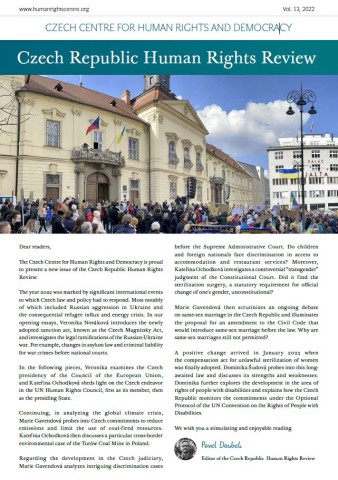The Czech Centre for Human Rights and Democracy is proud to present a new issue of the Czech Republic Human Rights Review.
The year 2022 was marked by significant international events to which Czech law and policy had to respond. Most notably of which included Russian aggression in Ukraine and the consequential refugee influx and energy crisis. In our opening essays, Veronika Nováková introduces the newly adopted sanction act, known as the Czech Magnitsky Act, and investigates the legal ramifications of the Russian-Ukraine war. For example, changes in asylum law and criminal liability for war crimes before national courts.
In the following pieces, Veronika examines the Czech presidency of the Council of the European Union, and Kateřina Ochodková sheds light on the Czech endeavor in the UN Human Rights Council, first as its member, then as the presiding State.
Continuing, in analyzing the global climate crisis, Marie Gavendová probes into Czech commitments to reduce emissions and limit the use of coal-fired resources. Kateřina Ochodková then discusses a particular cross-border environmental case of the Turów Coal Mine in Poland.
Regarding the development in the Czech judiciary, Marie Gavendová analyzes intriguing discrimination cases before the Supreme Administrative Court. Do children and foreign nationals face discrimination in access to accommodation and restaurant services? Moreover, Kateřina Ochodková investigates a controversial “transgender” judgment of the Constitutional Court. Did it find the sterilization surgery, a statutory requirement for official change of one's gender, unconstitutional?
Marie Gavendová then scrutinizes an ongoing debate on same-sex marriage in the Czech Republic and illuminates the proposal for an amendment to the Civil Code that would introduce same-sex marriage before the law. Why are same-sex marriages still not permitted?
A positive change arrived in January 2022 when the compensation act for unlawful sterilization of women was finally adopted. Dominika Šudová probes into this long-awaited law and discusses its strengths and weaknesses. Dominika further explores the development in the area of rights of people with disabilities and explains how the Czech Republic monitors the commitments under the Optional Protocol of the UN Convention on the Rights of People with Disabilities.
We wish you a stimulating and enjoyable reading

